Bribery in Contemporary Business: A Comprehensive Literature Review
VerifiedAdded on 2020/11/23
|10
|2581
|321
Report
AI Summary
This report presents a comprehensive literature review on the practice of bribery in contemporary business environments. It examines various perspectives from researchers and journals, exploring the complexities of bribery and its implications. The report delves into the factors that contribute to bribery, including cultural influences, inadequate administrative controls, and the pursuit of competitive advantages. It analyzes the negative impacts of bribery, such as declining employee morale, economic damages, and distortions in market functioning. The review also highlights potential remedies, such as anti-corruption programs, ethical leadership, and the importance of establishing clear ethical guidelines. The report concludes by emphasizing the need for a multi-faceted approach to combat bribery and promote ethical business practices. This report, contributed by a student, is available on Desklib, a platform offering AI-based study tools.
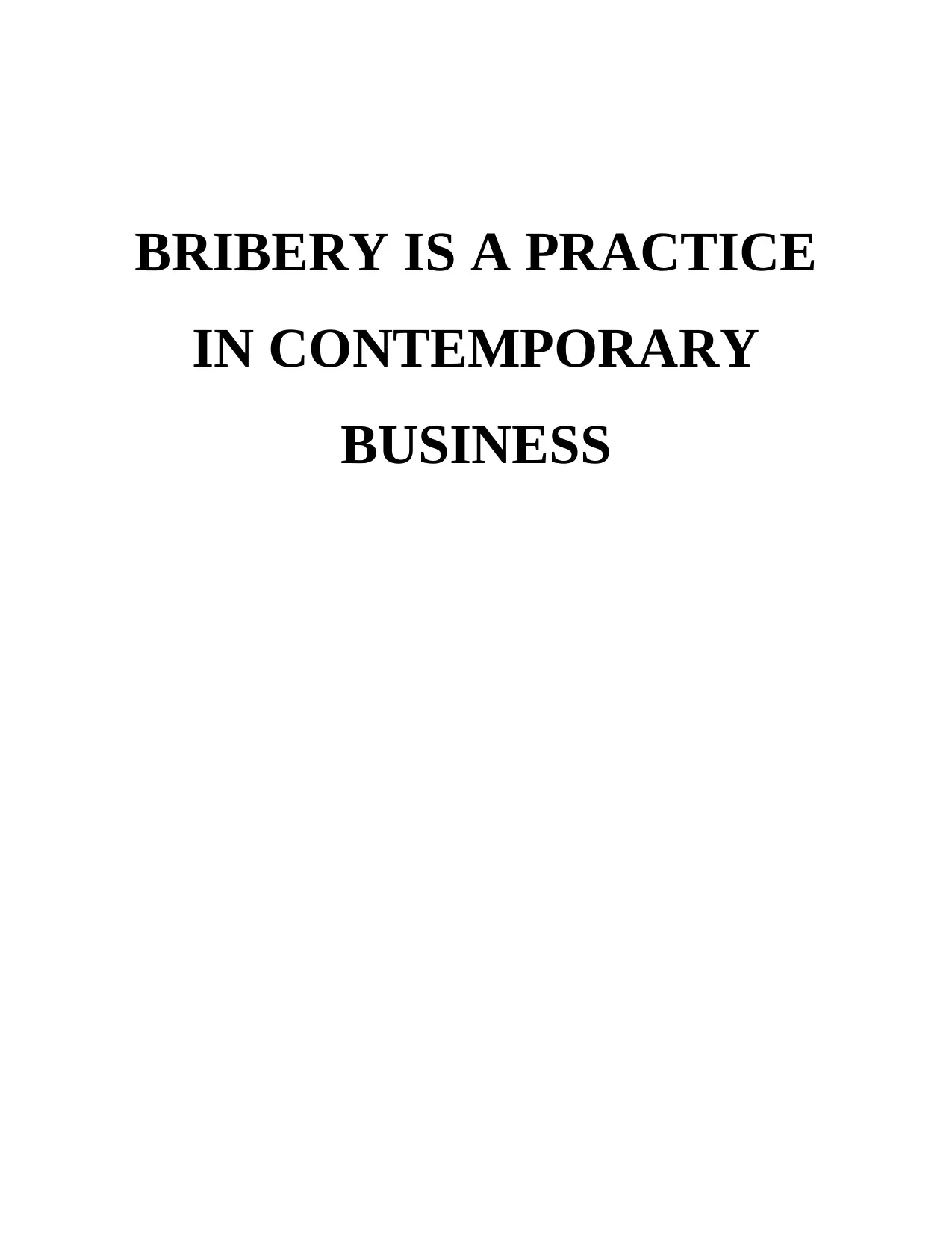
BRIBERY IS A PRACTICE
IN CONTEMPORARY
BUSINESS
IN CONTEMPORARY
BUSINESS
Paraphrase This Document
Need a fresh take? Get an instant paraphrase of this document with our AI Paraphraser
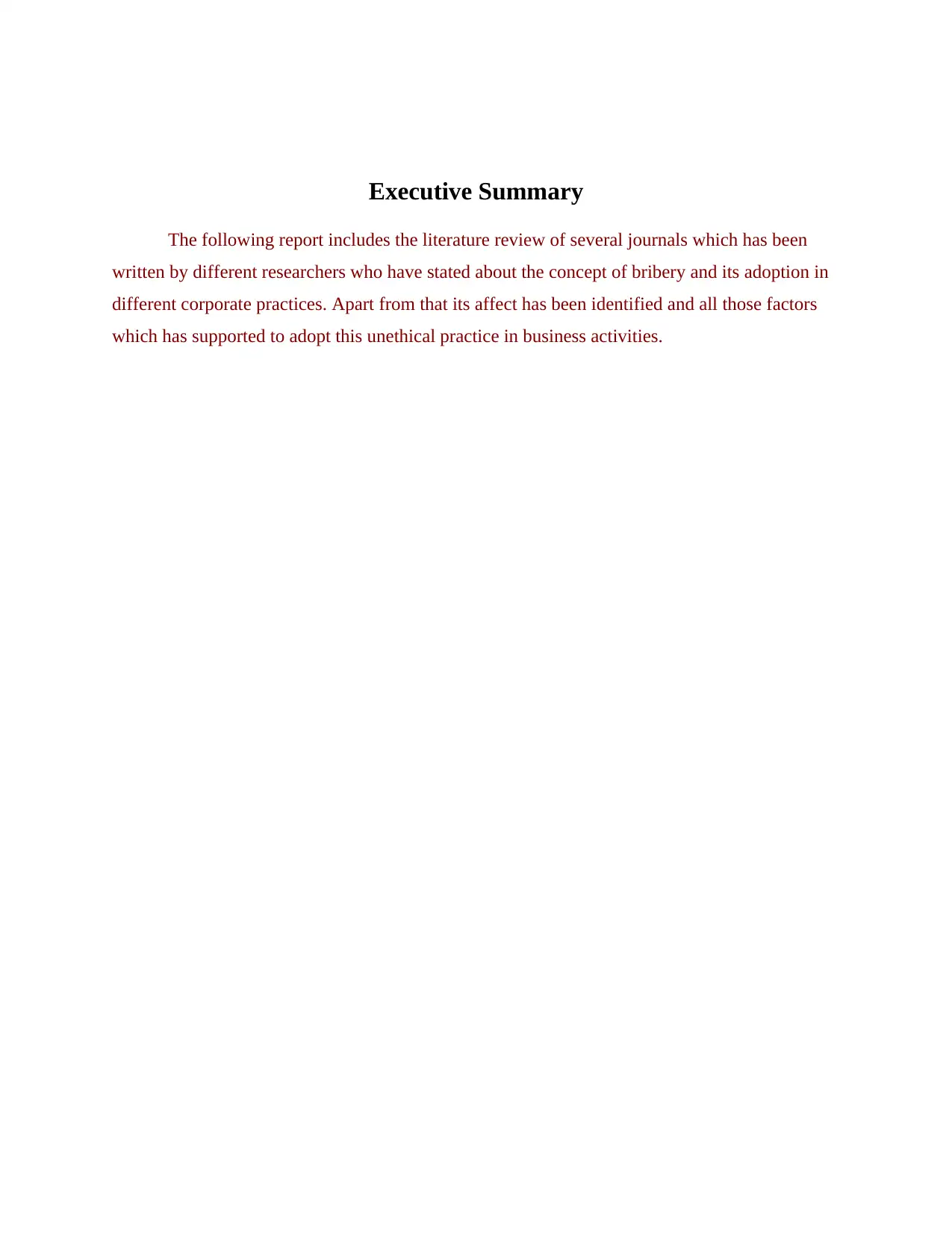
Executive Summary
The following report includes the literature review of several journals which has been
written by different researchers who have stated about the concept of bribery and its adoption in
different corporate practices. Apart from that its affect has been identified and all those factors
which has supported to adopt this unethical practice in business activities.
The following report includes the literature review of several journals which has been
written by different researchers who have stated about the concept of bribery and its adoption in
different corporate practices. Apart from that its affect has been identified and all those factors
which has supported to adopt this unethical practice in business activities.
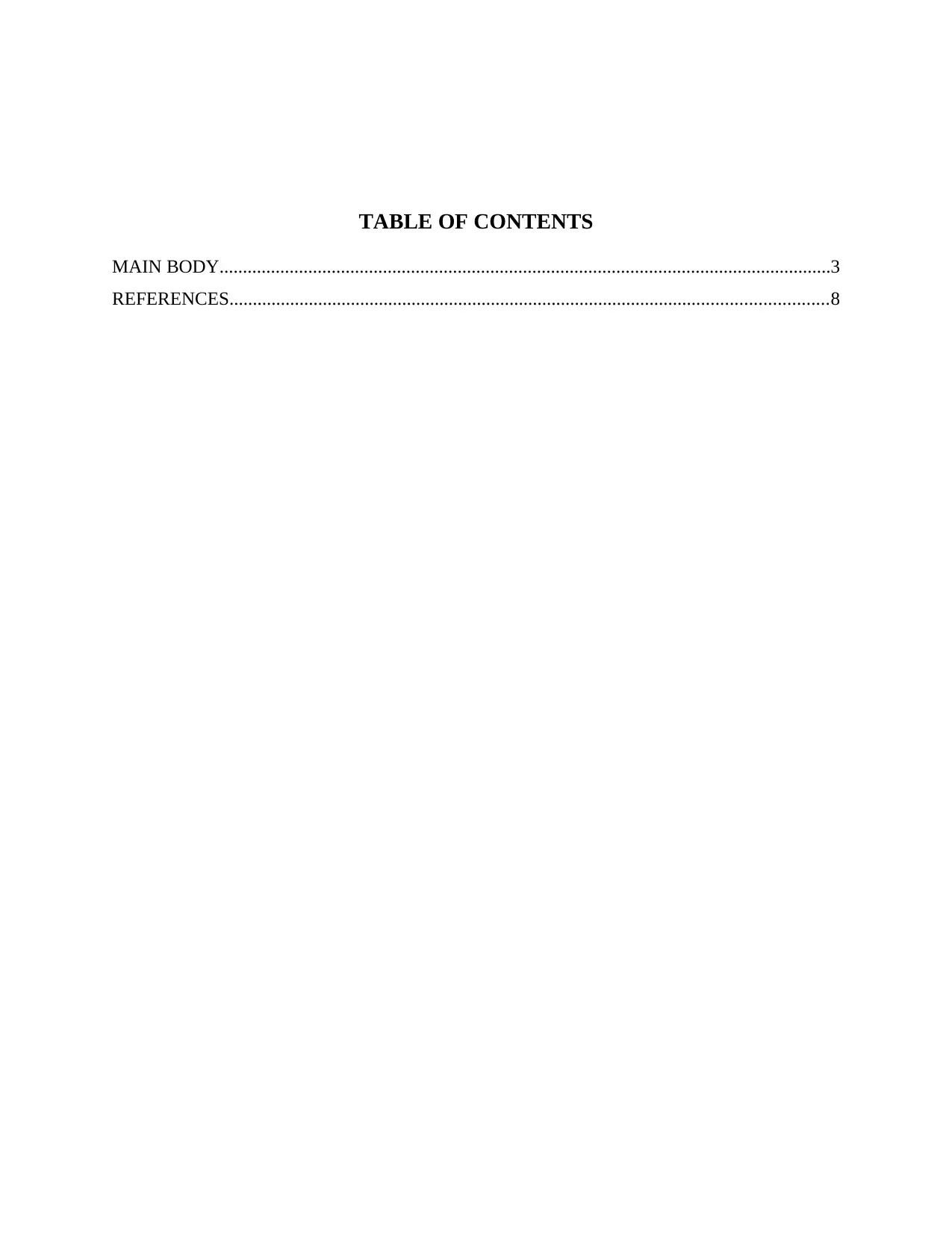
TABLE OF CONTENTS
MAIN BODY...................................................................................................................................3
REFERENCES................................................................................................................................8
MAIN BODY...................................................................................................................................3
REFERENCES................................................................................................................................8
⊘ This is a preview!⊘
Do you want full access?
Subscribe today to unlock all pages.

Trusted by 1+ million students worldwide
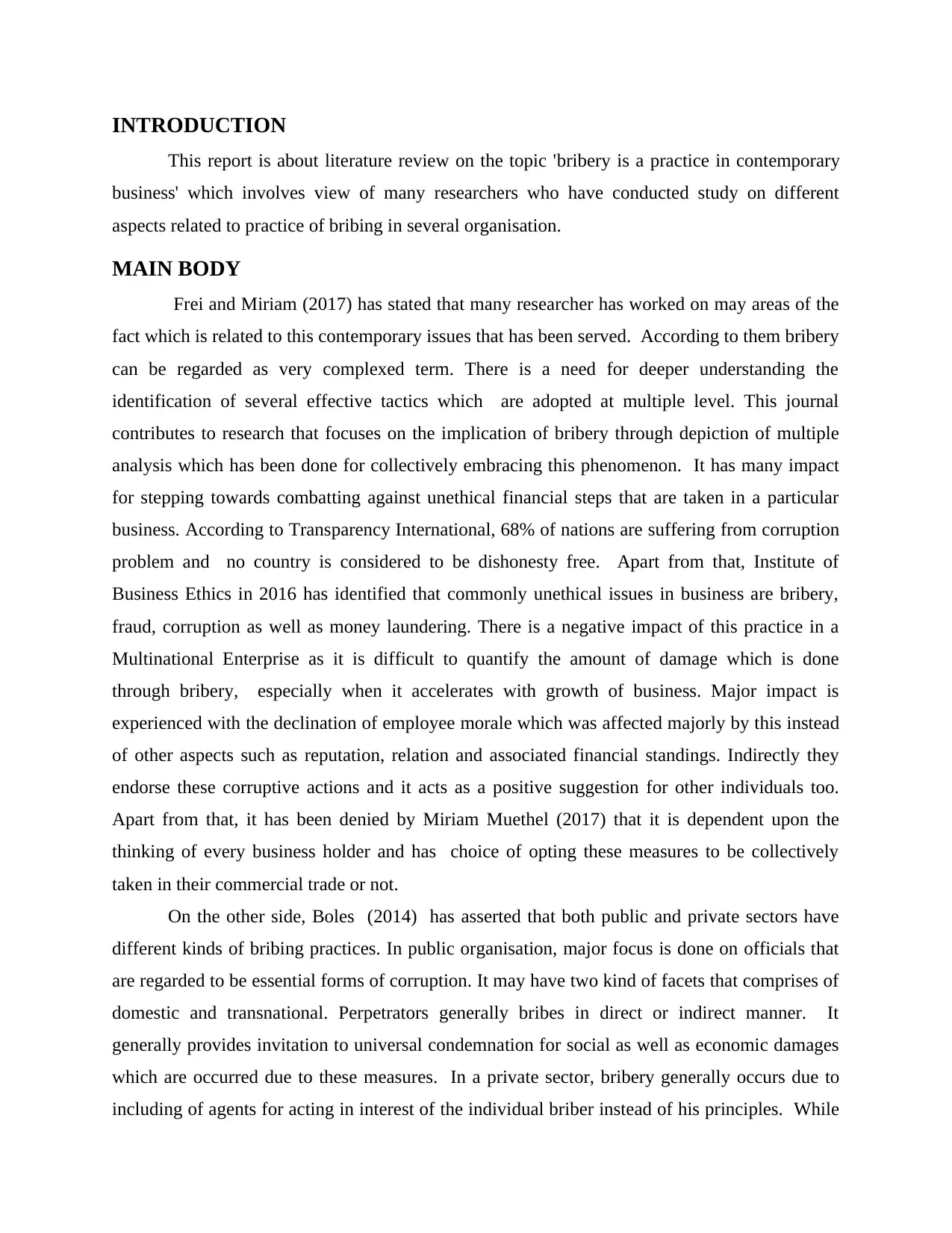
INTRODUCTION
This report is about literature review on the topic 'bribery is a practice in contemporary
business' which involves view of many researchers who have conducted study on different
aspects related to practice of bribing in several organisation.
MAIN BODY
Frei and Miriam (2017) has stated that many researcher has worked on may areas of the
fact which is related to this contemporary issues that has been served. According to them bribery
can be regarded as very complexed term. There is a need for deeper understanding the
identification of several effective tactics which are adopted at multiple level. This journal
contributes to research that focuses on the implication of bribery through depiction of multiple
analysis which has been done for collectively embracing this phenomenon. It has many impact
for stepping towards combatting against unethical financial steps that are taken in a particular
business. According to Transparency International, 68% of nations are suffering from corruption
problem and no country is considered to be dishonesty free. Apart from that, Institute of
Business Ethics in 2016 has identified that commonly unethical issues in business are bribery,
fraud, corruption as well as money laundering. There is a negative impact of this practice in a
Multinational Enterprise as it is difficult to quantify the amount of damage which is done
through bribery, especially when it accelerates with growth of business. Major impact is
experienced with the declination of employee morale which was affected majorly by this instead
of other aspects such as reputation, relation and associated financial standings. Indirectly they
endorse these corruptive actions and it acts as a positive suggestion for other individuals too.
Apart from that, it has been denied by Miriam Muethel (2017) that it is dependent upon the
thinking of every business holder and has choice of opting these measures to be collectively
taken in their commercial trade or not.
On the other side, Boles (2014) has asserted that both public and private sectors have
different kinds of bribing practices. In public organisation, major focus is done on officials that
are regarded to be essential forms of corruption. It may have two kind of facets that comprises of
domestic and transnational. Perpetrators generally bribes in direct or indirect manner. It
generally provides invitation to universal condemnation for social as well as economic damages
which are occurred due to these measures. In a private sector, bribery generally occurs due to
including of agents for acting in interest of the individual briber instead of his principles. While
This report is about literature review on the topic 'bribery is a practice in contemporary
business' which involves view of many researchers who have conducted study on different
aspects related to practice of bribing in several organisation.
MAIN BODY
Frei and Miriam (2017) has stated that many researcher has worked on may areas of the
fact which is related to this contemporary issues that has been served. According to them bribery
can be regarded as very complexed term. There is a need for deeper understanding the
identification of several effective tactics which are adopted at multiple level. This journal
contributes to research that focuses on the implication of bribery through depiction of multiple
analysis which has been done for collectively embracing this phenomenon. It has many impact
for stepping towards combatting against unethical financial steps that are taken in a particular
business. According to Transparency International, 68% of nations are suffering from corruption
problem and no country is considered to be dishonesty free. Apart from that, Institute of
Business Ethics in 2016 has identified that commonly unethical issues in business are bribery,
fraud, corruption as well as money laundering. There is a negative impact of this practice in a
Multinational Enterprise as it is difficult to quantify the amount of damage which is done
through bribery, especially when it accelerates with growth of business. Major impact is
experienced with the declination of employee morale which was affected majorly by this instead
of other aspects such as reputation, relation and associated financial standings. Indirectly they
endorse these corruptive actions and it acts as a positive suggestion for other individuals too.
Apart from that, it has been denied by Miriam Muethel (2017) that it is dependent upon the
thinking of every business holder and has choice of opting these measures to be collectively
taken in their commercial trade or not.
On the other side, Boles (2014) has asserted that both public and private sectors have
different kinds of bribing practices. In public organisation, major focus is done on officials that
are regarded to be essential forms of corruption. It may have two kind of facets that comprises of
domestic and transnational. Perpetrators generally bribes in direct or indirect manner. It
generally provides invitation to universal condemnation for social as well as economic damages
which are occurred due to these measures. In a private sector, bribery generally occurs due to
including of agents for acting in interest of the individual briber instead of his principles. While
Paraphrase This Document
Need a fresh take? Get an instant paraphrase of this document with our AI Paraphraser
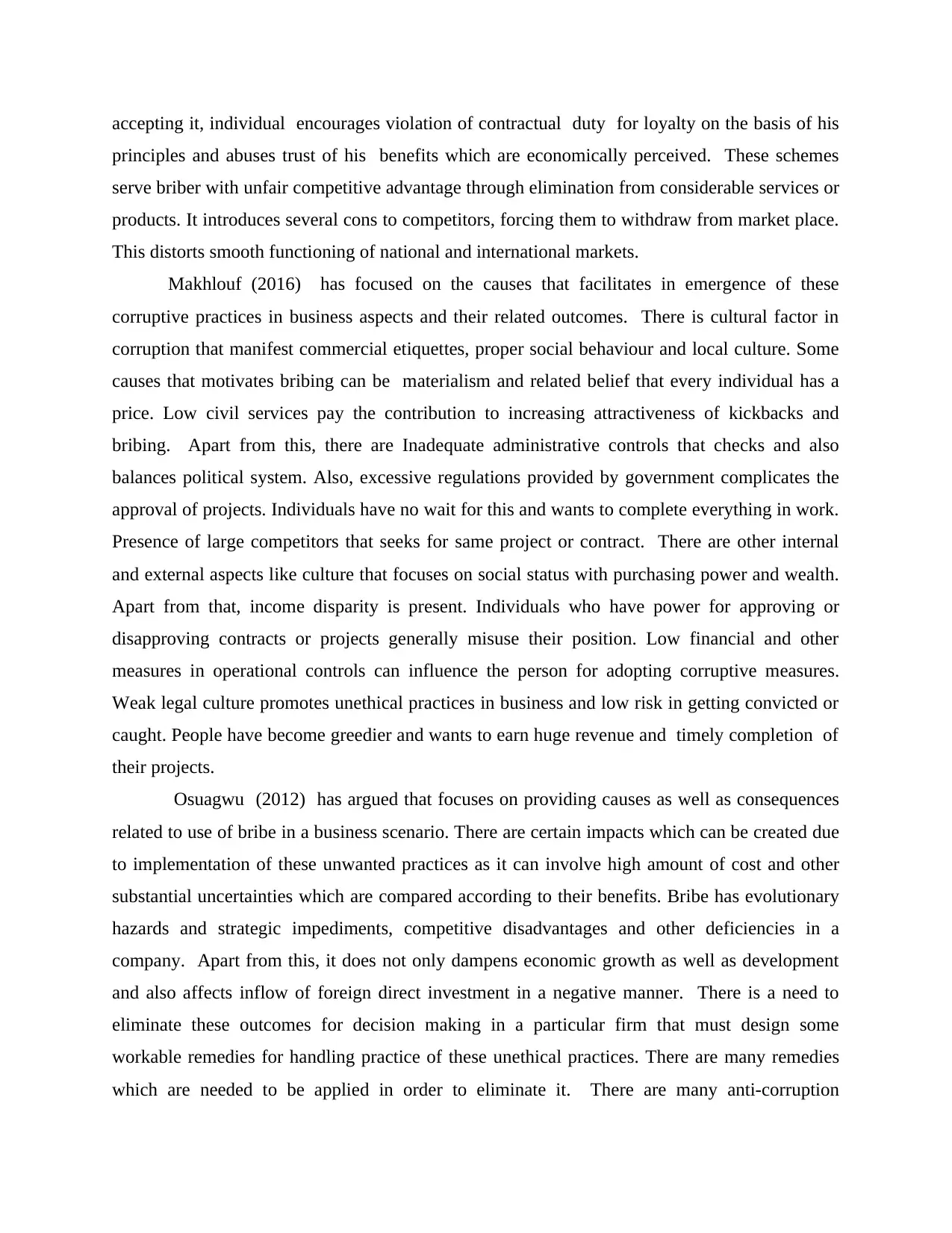
accepting it, individual encourages violation of contractual duty for loyalty on the basis of his
principles and abuses trust of his benefits which are economically perceived. These schemes
serve briber with unfair competitive advantage through elimination from considerable services or
products. It introduces several cons to competitors, forcing them to withdraw from market place.
This distorts smooth functioning of national and international markets.
Makhlouf (2016) has focused on the causes that facilitates in emergence of these
corruptive practices in business aspects and their related outcomes. There is cultural factor in
corruption that manifest commercial etiquettes, proper social behaviour and local culture. Some
causes that motivates bribing can be materialism and related belief that every individual has a
price. Low civil services pay the contribution to increasing attractiveness of kickbacks and
bribing. Apart from this, there are Inadequate administrative controls that checks and also
balances political system. Also, excessive regulations provided by government complicates the
approval of projects. Individuals have no wait for this and wants to complete everything in work.
Presence of large competitors that seeks for same project or contract. There are other internal
and external aspects like culture that focuses on social status with purchasing power and wealth.
Apart from that, income disparity is present. Individuals who have power for approving or
disapproving contracts or projects generally misuse their position. Low financial and other
measures in operational controls can influence the person for adopting corruptive measures.
Weak legal culture promotes unethical practices in business and low risk in getting convicted or
caught. People have become greedier and wants to earn huge revenue and timely completion of
their projects.
Osuagwu (2012) has argued that focuses on providing causes as well as consequences
related to use of bribe in a business scenario. There are certain impacts which can be created due
to implementation of these unwanted practices as it can involve high amount of cost and other
substantial uncertainties which are compared according to their benefits. Bribe has evolutionary
hazards and strategic impediments, competitive disadvantages and other deficiencies in a
company. Apart from this, it does not only dampens economic growth as well as development
and also affects inflow of foreign direct investment in a negative manner. There is a need to
eliminate these outcomes for decision making in a particular firm that must design some
workable remedies for handling practice of these unethical practices. There are many remedies
which are needed to be applied in order to eliminate it. There are many anti-corruption
principles and abuses trust of his benefits which are economically perceived. These schemes
serve briber with unfair competitive advantage through elimination from considerable services or
products. It introduces several cons to competitors, forcing them to withdraw from market place.
This distorts smooth functioning of national and international markets.
Makhlouf (2016) has focused on the causes that facilitates in emergence of these
corruptive practices in business aspects and their related outcomes. There is cultural factor in
corruption that manifest commercial etiquettes, proper social behaviour and local culture. Some
causes that motivates bribing can be materialism and related belief that every individual has a
price. Low civil services pay the contribution to increasing attractiveness of kickbacks and
bribing. Apart from this, there are Inadequate administrative controls that checks and also
balances political system. Also, excessive regulations provided by government complicates the
approval of projects. Individuals have no wait for this and wants to complete everything in work.
Presence of large competitors that seeks for same project or contract. There are other internal
and external aspects like culture that focuses on social status with purchasing power and wealth.
Apart from that, income disparity is present. Individuals who have power for approving or
disapproving contracts or projects generally misuse their position. Low financial and other
measures in operational controls can influence the person for adopting corruptive measures.
Weak legal culture promotes unethical practices in business and low risk in getting convicted or
caught. People have become greedier and wants to earn huge revenue and timely completion of
their projects.
Osuagwu (2012) has argued that focuses on providing causes as well as consequences
related to use of bribe in a business scenario. There are certain impacts which can be created due
to implementation of these unwanted practices as it can involve high amount of cost and other
substantial uncertainties which are compared according to their benefits. Bribe has evolutionary
hazards and strategic impediments, competitive disadvantages and other deficiencies in a
company. Apart from this, it does not only dampens economic growth as well as development
and also affects inflow of foreign direct investment in a negative manner. There is a need to
eliminate these outcomes for decision making in a particular firm that must design some
workable remedies for handling practice of these unethical practices. There are many remedies
which are needed to be applied in order to eliminate it. There are many anti-corruption
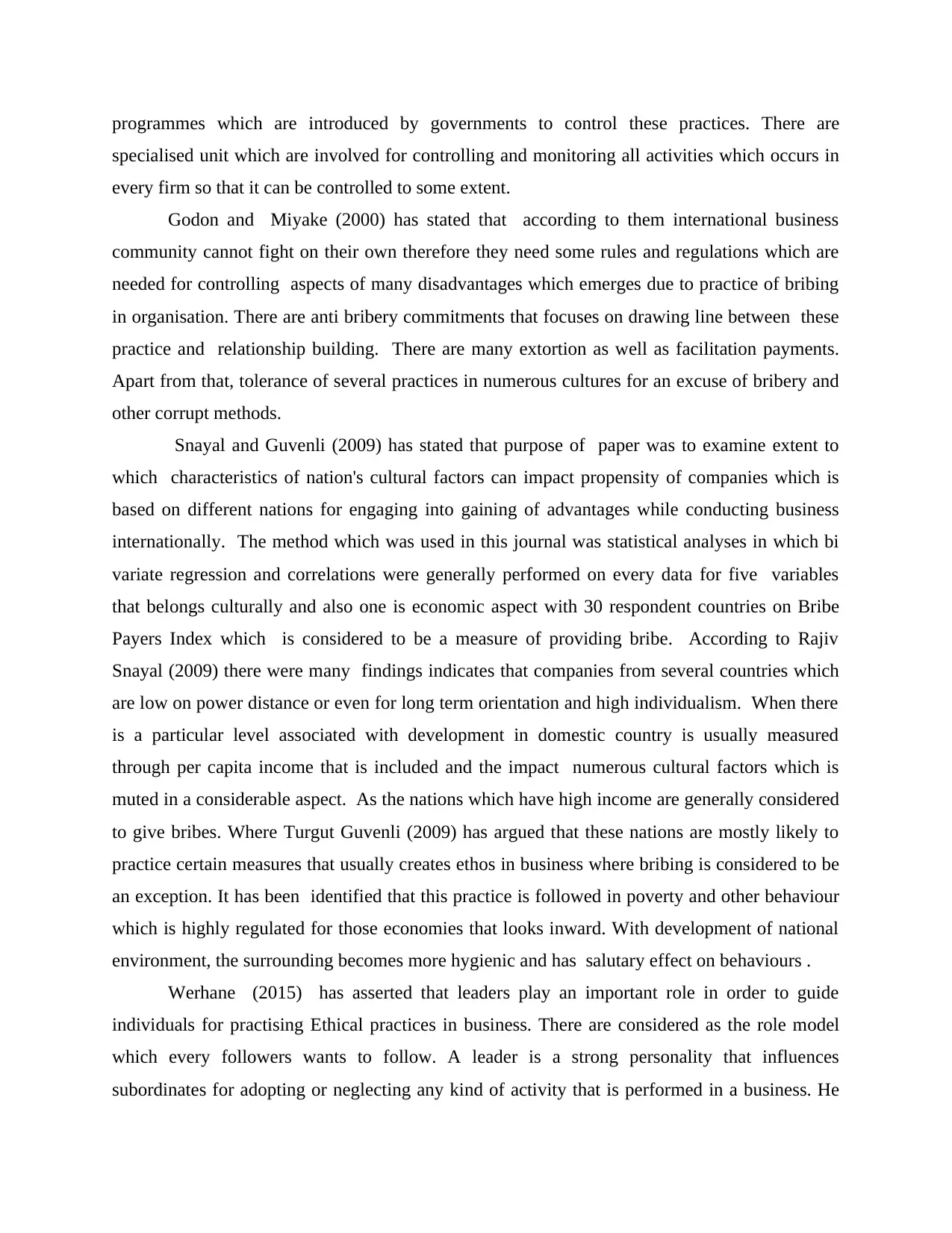
programmes which are introduced by governments to control these practices. There are
specialised unit which are involved for controlling and monitoring all activities which occurs in
every firm so that it can be controlled to some extent.
Godon and Miyake (2000) has stated that according to them international business
community cannot fight on their own therefore they need some rules and regulations which are
needed for controlling aspects of many disadvantages which emerges due to practice of bribing
in organisation. There are anti bribery commitments that focuses on drawing line between these
practice and relationship building. There are many extortion as well as facilitation payments.
Apart from that, tolerance of several practices in numerous cultures for an excuse of bribery and
other corrupt methods.
Snayal and Guvenli (2009) has stated that purpose of paper was to examine extent to
which characteristics of nation's cultural factors can impact propensity of companies which is
based on different nations for engaging into gaining of advantages while conducting business
internationally. The method which was used in this journal was statistical analyses in which bi
variate regression and correlations were generally performed on every data for five variables
that belongs culturally and also one is economic aspect with 30 respondent countries on Bribe
Payers Index which is considered to be a measure of providing bribe. According to Rajiv
Snayal (2009) there were many findings indicates that companies from several countries which
are low on power distance or even for long term orientation and high individualism. When there
is a particular level associated with development in domestic country is usually measured
through per capita income that is included and the impact numerous cultural factors which is
muted in a considerable aspect. As the nations which have high income are generally considered
to give bribes. Where Turgut Guvenli (2009) has argued that these nations are mostly likely to
practice certain measures that usually creates ethos in business where bribing is considered to be
an exception. It has been identified that this practice is followed in poverty and other behaviour
which is highly regulated for those economies that looks inward. With development of national
environment, the surrounding becomes more hygienic and has salutary effect on behaviours .
Werhane (2015) has asserted that leaders play an important role in order to guide
individuals for practising Ethical practices in business. There are considered as the role model
which every followers wants to follow. A leader is a strong personality that influences
subordinates for adopting or neglecting any kind of activity that is performed in a business. He
specialised unit which are involved for controlling and monitoring all activities which occurs in
every firm so that it can be controlled to some extent.
Godon and Miyake (2000) has stated that according to them international business
community cannot fight on their own therefore they need some rules and regulations which are
needed for controlling aspects of many disadvantages which emerges due to practice of bribing
in organisation. There are anti bribery commitments that focuses on drawing line between these
practice and relationship building. There are many extortion as well as facilitation payments.
Apart from that, tolerance of several practices in numerous cultures for an excuse of bribery and
other corrupt methods.
Snayal and Guvenli (2009) has stated that purpose of paper was to examine extent to
which characteristics of nation's cultural factors can impact propensity of companies which is
based on different nations for engaging into gaining of advantages while conducting business
internationally. The method which was used in this journal was statistical analyses in which bi
variate regression and correlations were generally performed on every data for five variables
that belongs culturally and also one is economic aspect with 30 respondent countries on Bribe
Payers Index which is considered to be a measure of providing bribe. According to Rajiv
Snayal (2009) there were many findings indicates that companies from several countries which
are low on power distance or even for long term orientation and high individualism. When there
is a particular level associated with development in domestic country is usually measured
through per capita income that is included and the impact numerous cultural factors which is
muted in a considerable aspect. As the nations which have high income are generally considered
to give bribes. Where Turgut Guvenli (2009) has argued that these nations are mostly likely to
practice certain measures that usually creates ethos in business where bribing is considered to be
an exception. It has been identified that this practice is followed in poverty and other behaviour
which is highly regulated for those economies that looks inward. With development of national
environment, the surrounding becomes more hygienic and has salutary effect on behaviours .
Werhane (2015) has asserted that leaders play an important role in order to guide
individuals for practising Ethical practices in business. There are considered as the role model
which every followers wants to follow. A leader is a strong personality that influences
subordinates for adopting or neglecting any kind of activity that is performed in a business. He
⊘ This is a preview!⊘
Do you want full access?
Subscribe today to unlock all pages.

Trusted by 1+ million students worldwide
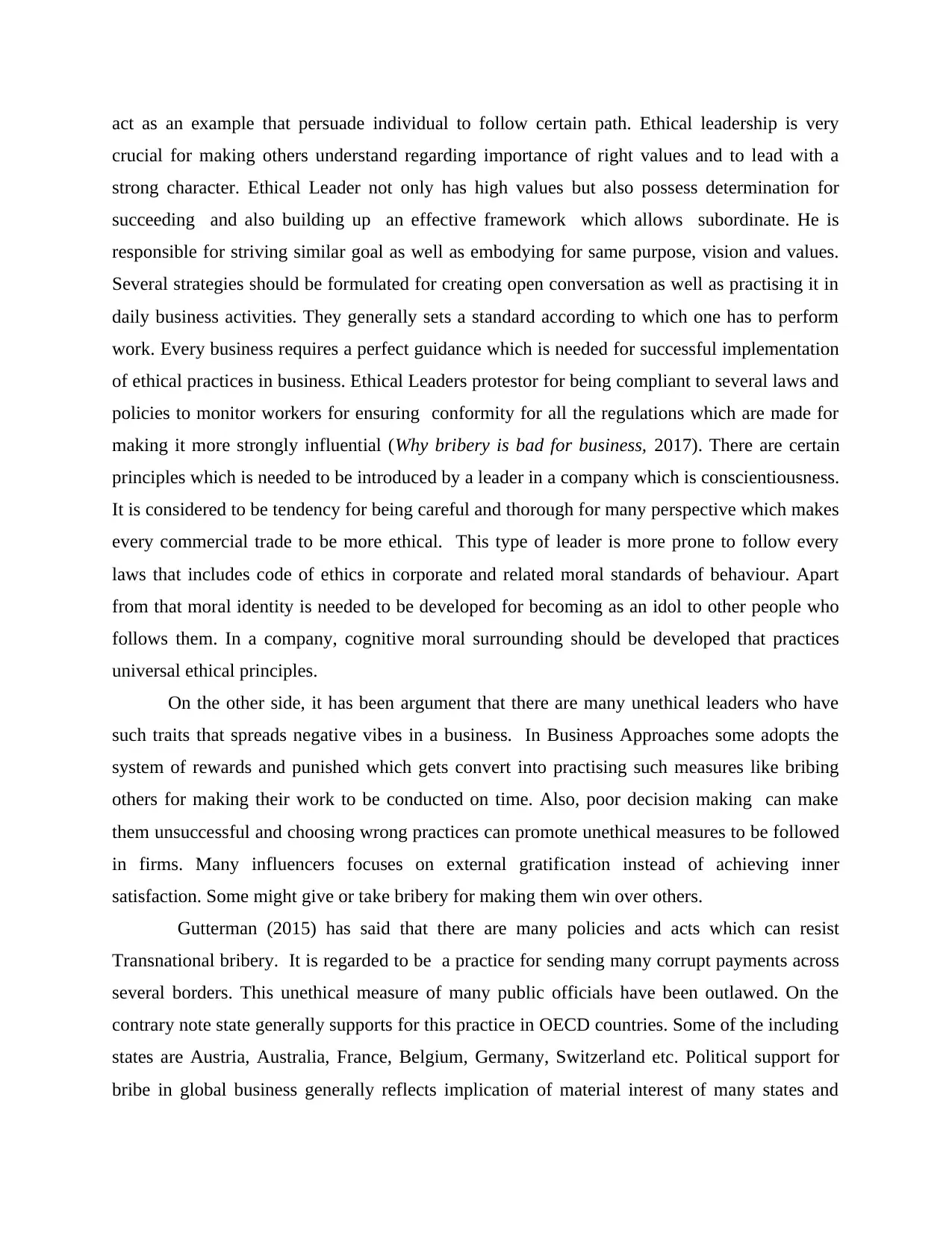
act as an example that persuade individual to follow certain path. Ethical leadership is very
crucial for making others understand regarding importance of right values and to lead with a
strong character. Ethical Leader not only has high values but also possess determination for
succeeding and also building up an effective framework which allows subordinate. He is
responsible for striving similar goal as well as embodying for same purpose, vision and values.
Several strategies should be formulated for creating open conversation as well as practising it in
daily business activities. They generally sets a standard according to which one has to perform
work. Every business requires a perfect guidance which is needed for successful implementation
of ethical practices in business. Ethical Leaders protestor for being compliant to several laws and
policies to monitor workers for ensuring conformity for all the regulations which are made for
making it more strongly influential (Why bribery is bad for business, 2017). There are certain
principles which is needed to be introduced by a leader in a company which is conscientiousness.
It is considered to be tendency for being careful and thorough for many perspective which makes
every commercial trade to be more ethical. This type of leader is more prone to follow every
laws that includes code of ethics in corporate and related moral standards of behaviour. Apart
from that moral identity is needed to be developed for becoming as an idol to other people who
follows them. In a company, cognitive moral surrounding should be developed that practices
universal ethical principles.
On the other side, it has been argument that there are many unethical leaders who have
such traits that spreads negative vibes in a business. In Business Approaches some adopts the
system of rewards and punished which gets convert into practising such measures like bribing
others for making their work to be conducted on time. Also, poor decision making can make
them unsuccessful and choosing wrong practices can promote unethical measures to be followed
in firms. Many influencers focuses on external gratification instead of achieving inner
satisfaction. Some might give or take bribery for making them win over others.
Gutterman (2015) has said that there are many policies and acts which can resist
Transnational bribery. It is regarded to be a practice for sending many corrupt payments across
several borders. This unethical measure of many public officials have been outlawed. On the
contrary note state generally supports for this practice in OECD countries. Some of the including
states are Austria, Australia, France, Belgium, Germany, Switzerland etc. Political support for
bribe in global business generally reflects implication of material interest of many states and
crucial for making others understand regarding importance of right values and to lead with a
strong character. Ethical Leader not only has high values but also possess determination for
succeeding and also building up an effective framework which allows subordinate. He is
responsible for striving similar goal as well as embodying for same purpose, vision and values.
Several strategies should be formulated for creating open conversation as well as practising it in
daily business activities. They generally sets a standard according to which one has to perform
work. Every business requires a perfect guidance which is needed for successful implementation
of ethical practices in business. Ethical Leaders protestor for being compliant to several laws and
policies to monitor workers for ensuring conformity for all the regulations which are made for
making it more strongly influential (Why bribery is bad for business, 2017). There are certain
principles which is needed to be introduced by a leader in a company which is conscientiousness.
It is considered to be tendency for being careful and thorough for many perspective which makes
every commercial trade to be more ethical. This type of leader is more prone to follow every
laws that includes code of ethics in corporate and related moral standards of behaviour. Apart
from that moral identity is needed to be developed for becoming as an idol to other people who
follows them. In a company, cognitive moral surrounding should be developed that practices
universal ethical principles.
On the other side, it has been argument that there are many unethical leaders who have
such traits that spreads negative vibes in a business. In Business Approaches some adopts the
system of rewards and punished which gets convert into practising such measures like bribing
others for making their work to be conducted on time. Also, poor decision making can make
them unsuccessful and choosing wrong practices can promote unethical measures to be followed
in firms. Many influencers focuses on external gratification instead of achieving inner
satisfaction. Some might give or take bribery for making them win over others.
Gutterman (2015) has said that there are many policies and acts which can resist
Transnational bribery. It is regarded to be a practice for sending many corrupt payments across
several borders. This unethical measure of many public officials have been outlawed. On the
contrary note state generally supports for this practice in OECD countries. Some of the including
states are Austria, Australia, France, Belgium, Germany, Switzerland etc. Political support for
bribe in global business generally reflects implication of material interest of many states and
Paraphrase This Document
Need a fresh take? Get an instant paraphrase of this document with our AI Paraphraser
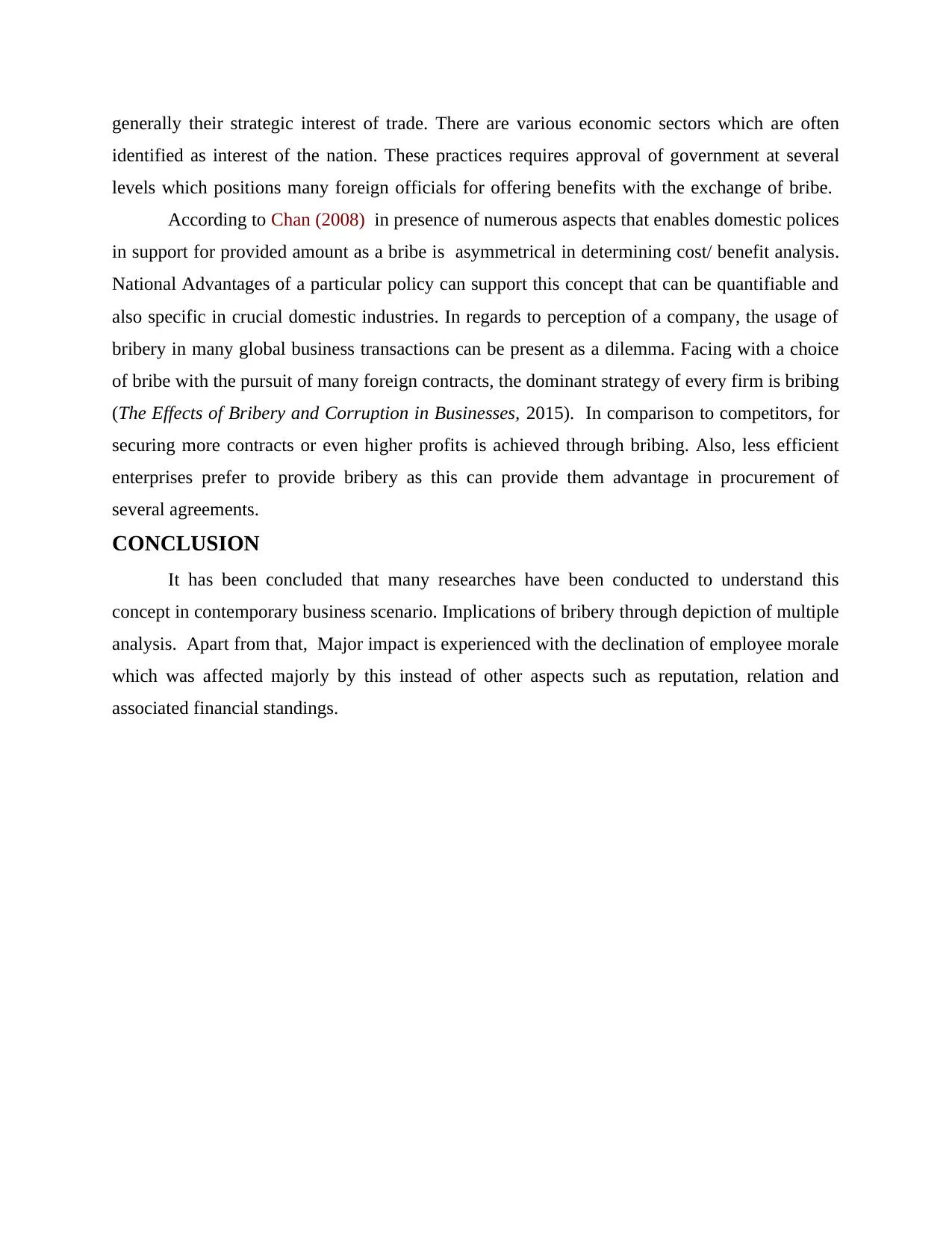
generally their strategic interest of trade. There are various economic sectors which are often
identified as interest of the nation. These practices requires approval of government at several
levels which positions many foreign officials for offering benefits with the exchange of bribe.
According to Chan (2008) in presence of numerous aspects that enables domestic polices
in support for provided amount as a bribe is asymmetrical in determining cost/ benefit analysis.
National Advantages of a particular policy can support this concept that can be quantifiable and
also specific in crucial domestic industries. In regards to perception of a company, the usage of
bribery in many global business transactions can be present as a dilemma. Facing with a choice
of bribe with the pursuit of many foreign contracts, the dominant strategy of every firm is bribing
(The Effects of Bribery and Corruption in Businesses, 2015). In comparison to competitors, for
securing more contracts or even higher profits is achieved through bribing. Also, less efficient
enterprises prefer to provide bribery as this can provide them advantage in procurement of
several agreements.
CONCLUSION
It has been concluded that many researches have been conducted to understand this
concept in contemporary business scenario. Implications of bribery through depiction of multiple
analysis. Apart from that, Major impact is experienced with the declination of employee morale
which was affected majorly by this instead of other aspects such as reputation, relation and
associated financial standings.
identified as interest of the nation. These practices requires approval of government at several
levels which positions many foreign officials for offering benefits with the exchange of bribe.
According to Chan (2008) in presence of numerous aspects that enables domestic polices
in support for provided amount as a bribe is asymmetrical in determining cost/ benefit analysis.
National Advantages of a particular policy can support this concept that can be quantifiable and
also specific in crucial domestic industries. In regards to perception of a company, the usage of
bribery in many global business transactions can be present as a dilemma. Facing with a choice
of bribe with the pursuit of many foreign contracts, the dominant strategy of every firm is bribing
(The Effects of Bribery and Corruption in Businesses, 2015). In comparison to competitors, for
securing more contracts or even higher profits is achieved through bribing. Also, less efficient
enterprises prefer to provide bribery as this can provide them advantage in procurement of
several agreements.
CONCLUSION
It has been concluded that many researches have been conducted to understand this
concept in contemporary business scenario. Implications of bribery through depiction of multiple
analysis. Apart from that, Major impact is experienced with the declination of employee morale
which was affected majorly by this instead of other aspects such as reputation, relation and
associated financial standings.
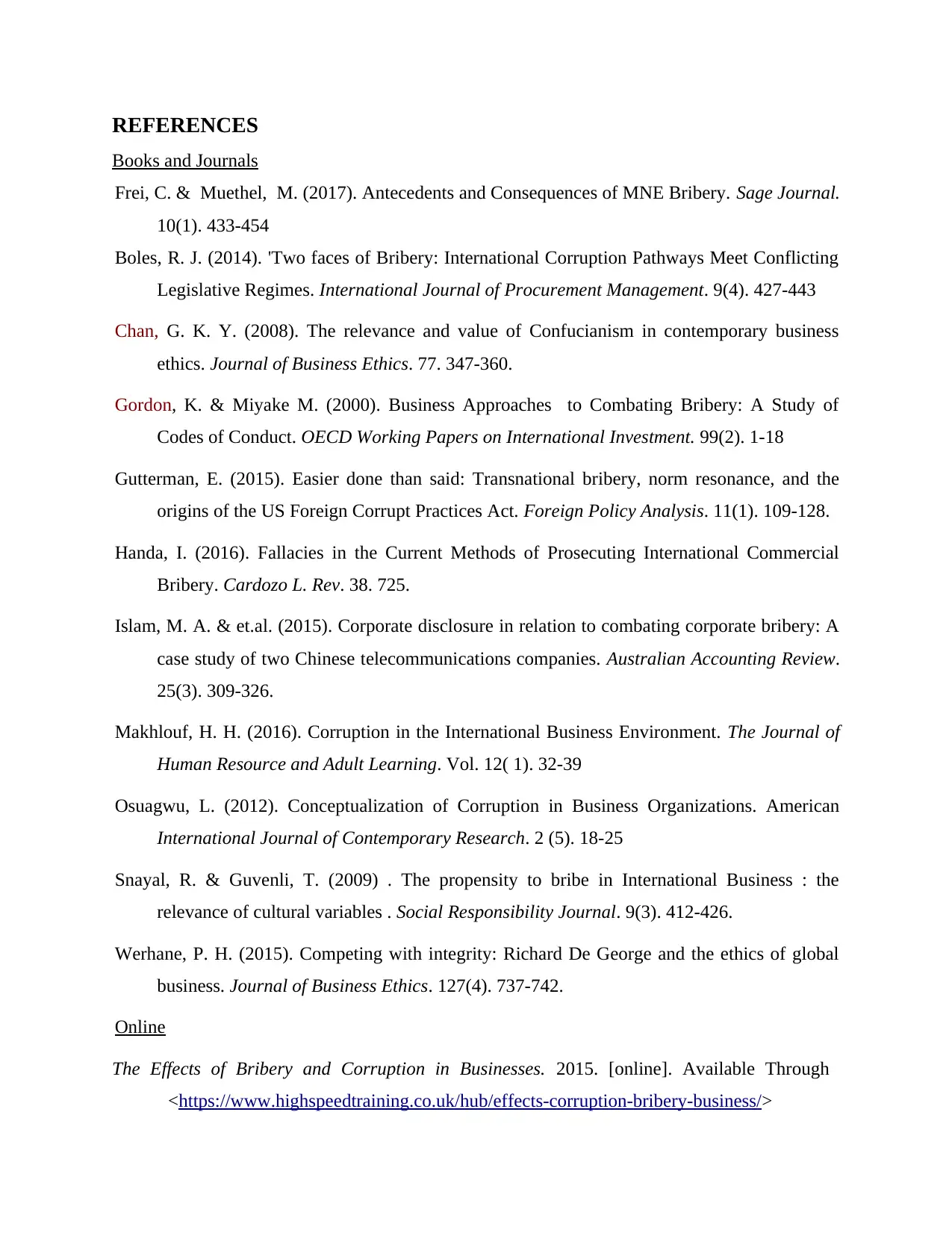
REFERENCES
Books and Journals
Frei, C. & Muethel, M. (2017). Antecedents and Consequences of MNE Bribery. Sage Journal.
10(1). 433-454
Boles, R. J. (2014). 'Two faces of Bribery: International Corruption Pathways Meet Conflicting
Legislative Regimes. International Journal of Procurement Management. 9(4). 427-443
Chan, G. K. Y. (2008). The relevance and value of Confucianism in contemporary business
ethics. Journal of Business Ethics. 77. 347-360.
Gordon, K. & Miyake M. (2000). Business Approaches to Combating Bribery: A Study of
Codes of Conduct. OECD Working Papers on International Investment. 99(2). 1-18
Gutterman, E. (2015). Easier done than said: Transnational bribery, norm resonance, and the
origins of the US Foreign Corrupt Practices Act. Foreign Policy Analysis. 11(1). 109-128.
Handa, I. (2016). Fallacies in the Current Methods of Prosecuting International Commercial
Bribery. Cardozo L. Rev. 38. 725.
Islam, M. A. & et.al. (2015). Corporate disclosure in relation to combating corporate bribery: A
case study of two Chinese telecommunications companies. Australian Accounting Review.
25(3). 309-326.
Makhlouf, H. H. (2016). Corruption in the International Business Environment. The Journal of
Human Resource and Adult Learning. Vol. 12( 1). 32-39
Osuagwu, L. (2012). Conceptualization of Corruption in Business Organizations. American
International Journal of Contemporary Research. 2 (5). 18-25
Snayal, R. & Guvenli, T. (2009) . The propensity to bribe in International Business : the
relevance of cultural variables . Social Responsibility Journal. 9(3). 412-426.
Werhane, P. H. (2015). Competing with integrity: Richard De George and the ethics of global
business. Journal of Business Ethics. 127(4). 737-742.
Online
The Effects of Bribery and Corruption in Businesses. 2015. [online]. Available Through
<https://www.highspeedtraining.co.uk/hub/effects-corruption-bribery-business/>
Books and Journals
Frei, C. & Muethel, M. (2017). Antecedents and Consequences of MNE Bribery. Sage Journal.
10(1). 433-454
Boles, R. J. (2014). 'Two faces of Bribery: International Corruption Pathways Meet Conflicting
Legislative Regimes. International Journal of Procurement Management. 9(4). 427-443
Chan, G. K. Y. (2008). The relevance and value of Confucianism in contemporary business
ethics. Journal of Business Ethics. 77. 347-360.
Gordon, K. & Miyake M. (2000). Business Approaches to Combating Bribery: A Study of
Codes of Conduct. OECD Working Papers on International Investment. 99(2). 1-18
Gutterman, E. (2015). Easier done than said: Transnational bribery, norm resonance, and the
origins of the US Foreign Corrupt Practices Act. Foreign Policy Analysis. 11(1). 109-128.
Handa, I. (2016). Fallacies in the Current Methods of Prosecuting International Commercial
Bribery. Cardozo L. Rev. 38. 725.
Islam, M. A. & et.al. (2015). Corporate disclosure in relation to combating corporate bribery: A
case study of two Chinese telecommunications companies. Australian Accounting Review.
25(3). 309-326.
Makhlouf, H. H. (2016). Corruption in the International Business Environment. The Journal of
Human Resource and Adult Learning. Vol. 12( 1). 32-39
Osuagwu, L. (2012). Conceptualization of Corruption in Business Organizations. American
International Journal of Contemporary Research. 2 (5). 18-25
Snayal, R. & Guvenli, T. (2009) . The propensity to bribe in International Business : the
relevance of cultural variables . Social Responsibility Journal. 9(3). 412-426.
Werhane, P. H. (2015). Competing with integrity: Richard De George and the ethics of global
business. Journal of Business Ethics. 127(4). 737-742.
Online
The Effects of Bribery and Corruption in Businesses. 2015. [online]. Available Through
<https://www.highspeedtraining.co.uk/hub/effects-corruption-bribery-business/>
⊘ This is a preview!⊘
Do you want full access?
Subscribe today to unlock all pages.

Trusted by 1+ million students worldwide

Why bribery is bad for business. 2017. [online]. Available Through
<https://www.complianceweek.com/blogs/the-man-from-fcpa/why-bribery-is-bad-for-
business>
<https://www.complianceweek.com/blogs/the-man-from-fcpa/why-bribery-is-bad-for-
business>
1 out of 10
Related Documents
Your All-in-One AI-Powered Toolkit for Academic Success.
+13062052269
info@desklib.com
Available 24*7 on WhatsApp / Email
![[object Object]](/_next/static/media/star-bottom.7253800d.svg)
Unlock your academic potential
Copyright © 2020–2026 A2Z Services. All Rights Reserved. Developed and managed by ZUCOL.





